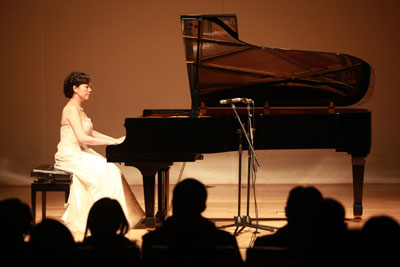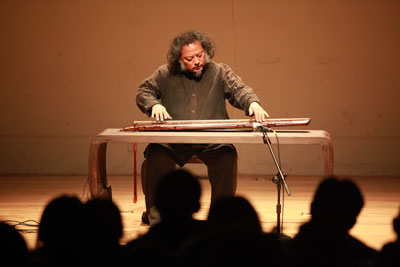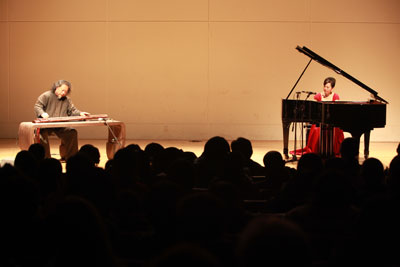林秋孜羽管鍵琴•鋼琴獨奏音樂會即將舉行
來源:天津大劇院‧聚焦 (http://www.tjgtheatre.org/cons.aspx?pid=1279)
被稱為“樂器之王“的鋼琴,大概是現代人們最為熟悉和習練者最多的西洋樂器了。88個黑白琴鍵牽動起琴身裡包著絨氈的小木槌,敲擊在鋼絲弦上,唱出心中的七情六欲。而在鋼琴還沒出現以前,一統天下的則是羽管鍵琴,又稱大鍵琴。其盛行於愉悅、奢華的巴洛克音樂時期,有別於鋼琴通過敲擊琴弦進行發聲,羽管鍵琴是通過琴鍵帶動羽毛管制成的撥子來撥動金屬弦,發出明亮、清澈、帶有金屬光澤的聲音。雖然同為鍵盤樂器,但發音方式的不同,決定了兩者在演奏技法上的差別——羽管鍵琴更多是依靠敏感的手指尖來控制樂感,而鋼琴則是通過指關節、手腕、手臂等機能的協調來營造音樂的張力與延續性。
能同時掌握這兩件樂器演奏之道的藝術家,必是一名懷著對音樂演進的崇敬心,擁有對音樂情感的細膩感知力以及富有精湛演奏技藝之人。林秋孜,便是這麼一位不可多得的藝術家。
林秋孜生於臺北,1978-1992年於維也納、茵斯布魯克、慕尼克深造。不僅取得了維也納音樂暨表演藝術大學鋼琴演奏最高文憑,還被維也納當地音樂院校授予教職,備受肯定的音樂成就使她在1995年被德國著名鋼琴品牌史坦威(Steinway & Sons)列入國際史坦威藝術家名錄。因為喜愛巴赫音樂,認為「我們不可能只透過鋼琴來瞭解巴赫」,她還特別前往歐洲巴洛克音樂中心茵斯布魯克(Innsbruck)深造羽管鍵琴,從巴洛克時代起,往前追溯古典音樂的起源,並順利拿到鋼琴羽管鍵琴的演奏與教育雙碩士文憑。在此期間,數度親赴薩爾斯堡國際音樂夏令營與莫斯科音樂學院研習深造。因此,林秋孜的音樂詮釋承襲了德、奧、法、俄樂派的精髓,兼具了寬廣與深厚。獨創的羽管鍵琴與鋼琴同場演出的鍵盤獨奏會形式,在樂壇備受矚目,演奏足跡遍佈世界各地。其對古典音樂的特別悟性和獨特的演奏風格,被認為是當今最優秀的鋼琴/羽管鍵琴獨奏家之一。典雅的氣質、人文涵養及自然流露的音樂性獲得了觀眾極大的迴響。
除了演奏之外,林秋孜還熱心於教育,創辦了近20年的「琴吟雅韻樂集」,提供了愛樂人一個展現才華的舞臺,並定期舉辦大師班與鋼琴音樂教育研習班來培養後繼之秀。她在學術研究上的表現更不容小覷,2001年特別前往德國萊比錫研究、完成《巴赫六首鍵盤組曲研究與詮釋》是此研究範疇的第一部中文著作,具有國際性的學術意義,至今已成一家之言,建立起了在鍵盤樂器方面的權威地位。
今年10月12日,林秋孜首度把自己獨創的羽管鍵琴與鋼琴音樂會帶到天津音樂廳,攜觀眾體驗一次音樂的聽覺旅行。音樂會上半場,用羽管鍵琴穿越回300多年前的巴洛克時期,演繹被譽為音樂「舊約聖經」的巴赫名作,以及史卡拉第、庫普蘭的美妙、愉悅和奢華。下半場則用鋼琴展現古典、浪漫時期巨匠貝多芬與蕭邦的精粹,還有其親自改編自弘一法師李叔同名作《送別》的主題幻想曲。在快節奏的都市生活中,一起放大聽覺,放慢呼吸,坐入音樂廳,享受一場豐富美妙的琴籟。
From Vienna to Beijing – Seeking the Root of Music – A Conversation between Piano and Guqin
By Han Fang
Published: November 28, 2011
A concert, The Conversation between Piano and Guqin, was held in the Multi-Function Hall of Peking University Hundred-year Memorial Hall on the night of November 27, 2011. There were two performers, a Taiwan-born pianist, Christiana Lin who had studied music in Vienna for sixteen years and had learnt the essence of German and Austrian music by heart; a guqin player, Wang Peng who had the experience of repairing hundreds of famous ancient guqins and is also a famous guqin performer himself. With the combination of two famous musicians in different fields and the innovative arrangement of the concert, it is easy to imagine how eagerly the audience was looking forward to this particular concert.
Christiana Lin looked dignified and graceful in her white gown.

The concert started from monologues by both instruments. Piano told the story of Vienna while guqin spoke of tales of Beijing. Ms. Lin, dressed in an elegant white gown that made her look dignified and graceful, told stories of how Chopin, Mozart, and Beethoven met with Vienna with her gentle narratives. Then, her piano music began with Chopin’s Nocturne No. 20 in c-sharp minor. The tempo of the nocturne was calm and mature and the rhythm clean and bright. Ms. Lin’s interpretation toward the nocturne was simple but with varied expression to successfully describe Chopin’s ups and downs and his complicated feelings toward Vienna. The melody wasn’t about flamboyance to please the audience, but was full of sincerity from the bottom of her heart. Her Sonata No. 10 in C Major, Movement 1 of Mozart was floating nimbly like watercolour applied on a beautiful mirror and sounded as clear as crystal. Her interpretation toward Sonata No. 17 in d minor, Movement 3 of Beethoven wasn’t your ordinary interpretation. Instead of performed as an anxious tempest, her sonata was played out with a unique touch of feminie tranquillity. Even with medium speed and controlled power, she had skillfully expressed Beethoven’s struggle with the strong expression by her left hand. Last piece of Ms. Lin’s performance was Fugue et Toccata which had been written by Hsu Tsang-Houei, a famous Taiwanese composer. With modern techniques to interpret music written in traditional pentatonic scale, the result was unique in its own right. This concert had built up an atmosphere for multiple dialogues. It not only let the performers and composers to accomplish their dialogue across time, but also managed to make the audience able to see through themselves while also communicating with the performers.

Guqin player Wang Peng performing Chinese classic music
As the other main character in this musical dialogue, guqin had immediately altered the atmosphere once it got on the stage. Mr. Wang Peng with grey hair and in a dark blue traditional Chinese garment looked like an intellectual from Jin Dynasty stepping into the modern time. Ping Sha Luo Yan is a composition which describes views and emotions. With vigorous sound of Guqin, Mr. Wang vividly introduced his audience to a painting of the spectacular scenery of a river in the autumn. Technique of rubbing was generously used in the performance to bring a clear echo which sounded like a big migrating bird spreading its wings. Long Xian Cao is adopted from a masterpiece of the Western Han Dynasty, Zhaojun Departs the Frontier. Its chords were tense in an overall stern mood, plus the airy overtone, to let the melody tell Zhaojun’s complicated emotion. Finally, since Yu Qiao Wenda is all about dialogue, the composition is about two characters conversing. The bright pentatonic scales progressed with different tunes to finally bring out the main theme “disregard all secular gains, and only care about nature.”

The unique enjoyment brought about by piano and guqin playing together
After three tunes, Mr. Wang stepped forward to explain the differences between eastern and western musics to the audience. In very simple terms, he talked about “technique, atmosphere, philosophy”, the three major clues of how to play guqin well. At the end of the performance, the two musicians had successfully combined eastern and western musics by performing a highly experimental Piano & Guqin Impromptu Duet. Guqin was calm and steady, while piano sounded refreshing and sincere. This unique duet had brought the audience enjoyment which they never had experienced before.
The music trip from Vienna to Beijing is not only about tracing back to the very beginning of the masterpieces and music itself, but also about leading the audience to look inside themselves. The concert was all about a dialogue between cultures as represented by piano and guqin, and such an innovative endeavour of the two performers will certainly become a precious and unforgettable memory to those who were lucky enough to witness that night.
(Resource: http://www.pku-hall.com/WYPPZZ.aspx?id=1728)